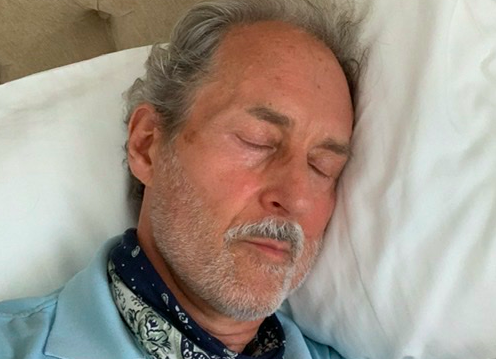In these unprecedented and challenging times, I have found many people have had trouble with their sleep.
The quality and quantity of our sleep has deteriorated, and this is almost certainly due to increased stress.
We are all familiar with the feelings associated with being stressed; our thinking and decision making is compromised, our intake of food and drink changes, and we become easily irritated and behave erratically.
Over the past four months, I have felt an almost imperceptible buildup of silent stress, which is like a fine silt, slowly building up and forming a distorted baseline. This stress has been evident first with the imposition of lockdown, then with its lifting and also with speculation about the uncertain future.
The good news is that sleep is the natural moment in our 24-hour cycle when we de-stress, but the problem is that most of us don’t get enough good quality sleep, going to bed exhausted and not waking feeling refreshed.
The less stressed we are, the better our sleep. That, in turn, boosts and maintains our immune system.
Here are my top 10 tips to ensure you receive the quality of sleep needed to be as productive and resilient as possible for the day ahead:
1. Reduce Caffeine Intake.
Caffeine is the world’s most widely consumed psychoactive drug—and it’s even given to children.
I gave up alcohol over 30 years ago, and coffee became an obsession. I would seek out small, independent coffee shops that made espresso with love and attention using traditional machines, and I would also use exotic blends in my cafetière at home, but it all came at a cost.
Every year, around my birthday, I would take a week off my daily consumption of about a litre of the black stuff, and I felt really bad as a result. Horrific headaches, slight tremors in my hands, and lacking in energy were reminders I was probably addicted. Three years ago, just before I went to India for three months, I quit. It was tough, but I knew for my long-term health it was best to stop.
What I learnt is that it’s best to make sure any caffeine intake is restricted to the morning, because 50 percent of the caffeine ingested is still in our system seven hours later. It was a revelation to discover that decaffeinated drinks are not caffeine-free, typically containing around 12 to 15 percent caffeine, and it’s also found in chocolate, tea, and some medicines.
2. Reduce Blue Screen Time.
Years ago, I greatly enjoyed watching TV in bed, but the blue screen light wrecked havoc on my circadian rhythms and suppressed the production of melatonin, the hormone that makes us feel sleepy. Any blue light, including a tablet or smartphone, is going to have the same effect.
I have gotten into the habit of taking a break from technology at least 40 minutes, usually longer, before heading for the bedroom—without this break my brain and body cannot stop the stimulating chemicals from subsiding. So that was the end of my spending “just a few moments” checking in on social media before I turn off the lights. The only rabbit hole I want to fall down is the one that is dark and soothing.
3. Bedtime Rituals.
For many of us, a bedtime ritual gets left behind at childhood. An hour before bedtime, I disengage from the day and prepare for my sleep journey by reading a book or having a bath, which counterintuitively reduces our core body temperature. This gives us a better chance for those shut-eye hours to do what they are supposed to do.
4. Keep Bedrooms Clean and Fresh.
Bed clothes and bed sheets get changed twice a week in my home. This may sound excessive, but sleeping eight hours per night for seven nights equates to 56 hours.
I wouldn’t dream of wearing the same clothes for that many hours without changing them.
5. Bedroom Temperature.
Keeping the bedroom two degrees cooler than my body temperature, around 65°F /18.3°C, makes a big difference. With heat waves more common, I find sleeping in lightweight cotton more comfortable than being naked, because it wicks away moisture.
In the cooler months, I make sure my bedroom is not too warm before I go to sleep—I want the bed to be the cosy place, not the room.
6. Bedroom Tidiness.
Removing clutter soothed my mind and removed distractions. I made my bedroom soft, quiet, luxurious, and non-stimulating—turning it into an oasis of calm and a room unlike any other in my home, so it is only used for sleep and intimacy.
All electrical devices have been removed, and I never work from my bedroom—that takes place elsewhere.
7. Leave the Bedroom if you Wake at Night.
One tip I have found invaluable is that if I wake up in the night, I simply get up, move to another room, and relax without looking at any blue light, ’til I feel sleepy and ready to go back to bed.
This has trained my brain to know that my bedroom is not a place for lying awake—it’s only for sleeping.
8. Routine.
Without a doubt, keeping to a strict routine has made a huge difference to my energy levels and cognitive ability.
I try to make sure I go to bed and wake up at the same time, even on weekends, and I resist watching that next episode on Netflix, which can wait for another day.
Creating a sustainable routine with nourishing habits and a daily structure helps me boost and maintain my emotional energy and physical health, which ultimately increases my sleep quality.
9. Darkness.
The more light I can remove from my bedroom, the better rested I will be. I make sure the bedroom is as dark as possible before turning in for the night, and I use thick curtains to seal out unnatural light as much as possible.
10. Don’t let yourself get Exhausted.
Over the past 20 years, I have realised that it is important to go to bed tired, not exhausted, and that rest is vitally important, even during the day.
We don’t have to push ourselves so hard all the time—and that’s coming from a type A personality.
By following these simple steps, I have boosted my sleep quality.
When I am properly rested, my days are smoother and more productive. I have more energy and feel resilient to stress and whatever else gets thrown my way.
I am more creative and adaptable; relationships are easier, and I have greater clarity and perspective. Challenges are easily overcome, and I get more done.
AUTHOR: ANTHONY THOMPSON
IMAGE: AUTHOR'S OWN


No comments:
Post a Comment